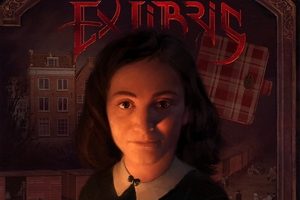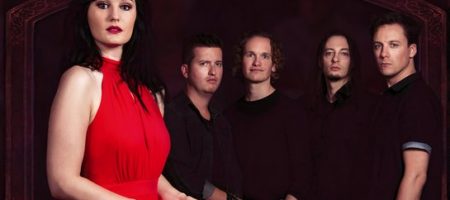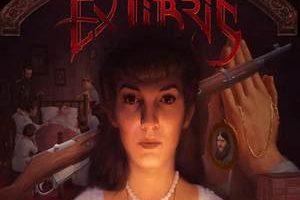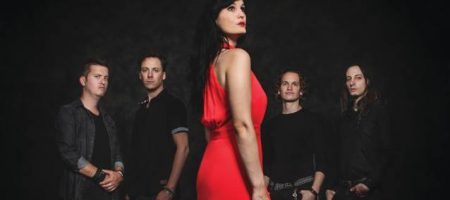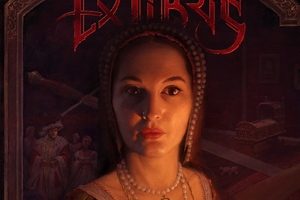Ex Libris – Wrapping Up the ‘Ann’ Trilogy
Thursday, 7th November 2019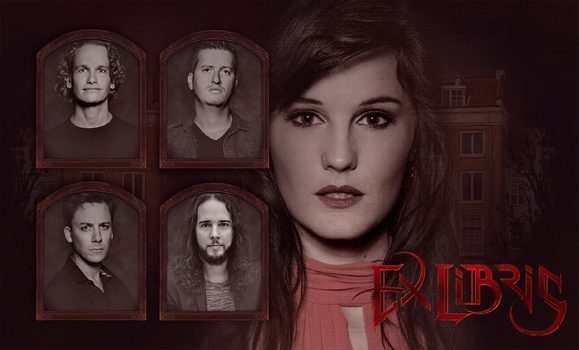
Over the course of the last year and a half, Ex Libris have been releasing EPs with a distinctive theme. That being a particular “Ann” from the history books and setting it to life within a progressive metal soundscape that also includes elements from the time period. The approach has been unique, issuing one chapter at a time and allowing the act to really dive into that particular person and their background.
With the last of the trilogy on the horizon focusing in on Anne Frank (the first two being Anne Boleyn and Anastasia Romonova), it’s safe to say that the band’s efforts have been rewarded. Each release has a vibe of its own, yet it all comes together to create something wondrous and impressive. As we have for the last two chapters, we chatted with vocalist Dianne van Giersbergen. For this time around, we got her thoughts on Chapter 3’s Anne Frank and the process as a whole, look back at the 3 Ann characters and what she’s learned from them, as well as what lies ahead for Ex Libris.
Dead Rhetoric: How does it feel to finally be done with such an ambitious project?
Dianne van Giersbergen: It’s amazing! You can’t believe how it feels. It’s been such a long journey! It’s been very rewarding – stressful is not the right word, but it’s been intense. It’s so different from releasing an album. If you do an album, it’s just one. So now we have three – and it’s three times in communicating to the outside world. I thought it was cool, because people can speak to us much easier, and they do. But there’s also keeping up with the content and making sure that it looks nice all the time. It’s almost a day job. But then again, the result is wonderful, so I’m not complaining.
Dead Rhetoric: What do you want people to take away from the album, when hearing it as a whole?
van Giersbergen: I just hope that everyone dives into the three chapters in their own way. They are three stories from history and I hope that everyone will learn from it, whatever he or she needs in their own personal situation. I think there is so much we can still learn from history, and also things that we do not have to repeat when we are able to look back and learn from mistakes that were made, or how things played out back then…and things we can avoid right now. I’m a firm believer that everyone, in their own situation, has a certain angle from which they view a story. I really hope that these stories can really help people find their way, or find comfort, or even prevent mistakes.
Dead Rhetoric: What do you feel distinguishes the Anne Frank portion of the trilogy from the other two parts?
van Giersbergen: For us, writing this one was most difficult. It’s so recent. I wouldn’t say that there is something that stands out, it’s more the other way around. Before, we could decide which part of the stories that we wanted to highlight, we had to make sure that the story is told in complete truth. We did that with the last two stories, but this one is much better known, and there are still survivors alive, be it very old but still alive. Their children are here and are watching everything that goes on with the Holocaust. I think what was most important for this chapter was that we treaded very carefully.
For example, with the artwork, we chose not to put my face into it as much as the other two. It’s out of respect for those who are still with us, and family members who are survivors of the Holocaust. I think it’s a story that needs to be told, or retold. But more in a way like, “Hey, do you still remember?” instead of “Who wants to hear a story about…” It doesn’t need to be that in much in your face, and music-wise, it’s a combination of Chapter 1 and Chapter 2. So it’s progressive and symphonic, but for me as a vocalist, it’s not technically lighter – but I didn’t do a crazy scene in which I die, like we had done for the first two chapters. Which was also a deliberate choice, because we wanted this Anne to remain with us through her diary. That’s why we don’t take it all the way to the concentration camp.
In this way, you hear the big outro, which for us is the moment when the train departs and they set off for the rest of their lives, which were really miserable and horrible, but there are so many documentaries and movies about, as well as thousands of museums. So we skipped that part, and we go straight into her father returning to Amsterdam, finding her diary and reading a passage in which she says, “I wish that I could be a famous writer, and I think my diary is a pretty good start.” But of course you didn’t hear it that way, because it is spoken in Dutch.
Dead Rhetoric: What was it like to be able to record a sample from the Anne Frank house in Amsterdam?
van Giersbergen: We went there with the full band, and Joost [van den Broek], who is kind of a band member for this chapter, so it’s the full band. Not only him, but the engineer from Sandlane Recording Facilities – they came up with the idea to record an impulse response sample. It was very special to do – we didn’t really ask the Anne Frank house if we could do that [laughs], so we did it in a bit of sneaky way. You can somehow do that with light equipment.
Getting the recording itself wasn’t that special, but having it and getting it to work, and having my speaking parts from her bedroom…that is the more incredible thing about it. The result. I think for our listeners, this will be an extra treat. People from all over the world will be playing our music, and I know that many of them will never make it to Amsterdam or get the chance to visit her house, but they can still listen to her words, through my voice, from her house. I’m still amazed that it was possible.
Dead Rhetoric: Now that you have all three parts, what drew you towards these three women? Do you feel that they have certain things in common between them besides their tragic ends?
van Giersbergen: I was the one who chose Anne Boleyn, and our former keyboard player Koen Stam chose Anastasia, and I think it was more of a band decision that with this year also being Western Europe celebrating 75 years of freedom, that Anne Frank was the only logical choice for Chapter 3. What they have in common is not only the name, and tragic story…and, a very important one for me, is that they are all women who were, and I know it doesn’t sound very nice, but were simply in the wrong place at the wrong time. That is a devastating feeling, that sometimes no matter what you do, you can’t escape your fate. They all had this in a completely different way. It’s all about injustice, and that we have to remember those who weren’t able to fight. It could have been, or had brought a very important part of history to the world.
For example, the story of Anne Boleyn. Making Henry VIII the first king ever to file for divorce. It wasn’t called a divorce back then, it was an annulment, but nowadays that would mean a divorce. Which is the reason that Meghan Markle can now marry Prince Harry. So it’s a big part of history, and the whole arrangement of Queen Elizabeth now being head of state and of church, is because of Henry’s decision back then, because of Anne Boleyn. The way that we remember the Holocaust is through the face of Anne Frank. We didn’t want to portray her as the face of the Holocaust, we wanted to portray her as this innocent young girl, who missed out on her life, because of the WWII situation. Giving her back to life, because she already missed out on her own. It’s like giving them another moment to shine, and to tell their story.
Dead Rhetoric: Do you feel that diving into their stories and histories made you a better person in some regard?
van Giersbergen: For sure – they have let me grow. I think that everything you encounter in your life, whether it’s a problem or a beautiful thing, everything helps you develop who you are as an individual. That’s just what you normally encounter, no matter if they are big or small. But I do think that if you take an interest in other people’s lives, and you are able to open up: whether it’s your neighbor, or it’s one of our Anns that you get to know through our stories – which is different because they are from history – but you get to know these people as if they were alive, and as if you could have a conversation with them.
I’m definitely convinced that they helped me grow, and allowed me to see things in a different light, and most importantly, allowed me to value what I have. For example, now that we have dove so far into the history of Anne Frank, far more than her history but the situation of WWII, which was only 75 years ago in the very place where I am living as well. It makes you feel very humble and thankful to those who fought for us, so we are now living in freedom. Maybe that was something that I didn’t realize as much before. It also feels silly to say that, because I think everyone should value those who laid down their lives for our freedom, but it sounds horrible – we are so used to our freedom that we overlook how precious it is.
Dead Rhetoric: What do you as a band feel that you’ve taken away from the recording process of doing it in three parts or focusing on historical figures that you will utilize in the future?
van Giersbergen: Yes, I actually really loved the process of it all. Doing the three different recordings, and also having the time to prepare ourselves in a different manner, makes the result of aiming for three different sounds much better than if you were doing it all at once. Doing it all at once would have resulted in thinking you were doing something different, but in the end, it would be the same. The preparation wouldn’t have been as focused as what we were able to do.
I love that we had enough room to really sit down and brainstorm the sound of one chapter without concerning ourselves with the other ones. Being able to have this focus was such a good thing for an artist. We did everything at our own tempo – of course, there were deadlines because we did the crowdfunding and people were expecting music so we had to deliver at a certain point [laughs]. But still, the focus we had was what I think every band should have.
Dead Rhetoric: So will you aim for future releases to also have a historical aspect, since the Ann trilogy was not your first attempt in this area?
van Giersbergen: Yeah, we absolutely love this! With Madea, we did a bit of history but it was different because it wasn’t real – it was from Greek mythology. The story is out there, and you can’t change it a lot, but it doesn’t hurt anyone personally if you interpret a character a bit differently than others do – it’s just taste and interpretation then. If you portray a real character, it’s tougher.
It’s funny because fans are already giving us suggestions about who to cover next. We have been actually joking and saying that since we started with “A” the next album should be three characters with a “B” [laughs]. But if we do that, we have a long way to go!
Dead Rhetoric: What was it like being back on stage with Ayreon recently?
van Giersbergen: It was very cool. It was a completely different setting than what I’m used to. As you might know, I mostly did backing vocals – just a few lead parts. I was a bit surprised when the question came, because I had never done backing vocals. I also don’t see myself as a backing singer, but Ayreon was convincing [laughs]. It cannot hurt to join his family on stage. I saw it as a nice adventure. Of course, being on stage again was a big treat for me. It felt like coming home, even though the shows just flew by. It was just one weekend. But there was a lot of preparation, and it involved a lot of other cool musicians, so it was a lot of fun!
Dead Rhetoric: Like you said, it was kind of a family thing…
van Giersbergen: Yeah, it really was a family thing! It was 4 shows in 3 days, but there was also a dress rehearsal and a full rehearsal before it. So it was more like 6 shows in 4 days, so it was nuts! That also leads to people getting a little flu-ish, and then you know that you are a family because people start caring about one another – bringing tea and little sweets for your throat and stuff. That’s heartwarming.
Dead Rhetoric: This kind of goes right with that – what have you found to be the best way to keep your voice in shape?
van Giersbergen: The best thing you can do is live as healthy as possible, sleep enough, and practice enough. The voice needs to have a routine to warm up as well as cool down. The vocal folds are muscles, and like with any sport, it is important to keep them well trained and hydrated. And give them enough rest. The best thing after a concert is to shut up, even though that’s not the coolest thing to do. You are always the party pooper then, but it is best for the voice. There’s always a last show too, afterwards you can go nuts [laughs]!
Dead Rhetoric: In watching the last Vlog that was shared from the band, I got curious – how often does your dog sing with you?
van Giersbergen: It’s more complaining that he does, but it sounds like singing [laughs]. It does sound cute, but he doesn’t mean it in a cute way. It’s mostly when I sing notes above the G2. Let’s just say that high notes will make him sing-a-long, or another words, make him complain [laughs]. But the funny thing is, I’m vocalizing in the kitchen because I like the acoustic there, and it doesn’t interfere with the work of other people, but I can put him in one of the control rooms and he still wants to be with me, even if I’m singing. He wants to be with me and just says, “Yeah, you shut up now” [laughs]. But I like that he’s really stubborn, but it also makes him naïve and funny. He’s a wonderful companion.
Dead Rhetoric: It’s funny that you know the point at which the howling will commence.
van Giersbergen: Yeah, but he will also increase and I can recognize from his tone the level of annoyance he has. At first, it’s a short bark, and later on he will really fire at me like, “Okay, I’ve had it with you!” [laughs]
Dead Rhetoric: With the recording of the album completed, what’s next for Ex Libris?
van Giersbergen: We have talked already about having focus, and we have talked in the band about doing live shows and we decided to save that until we were done with the album, and then move onto the next step. It’s a completely different thing to organize a live show than to organize a chapter or album. We chose to keep that separation. We really want to bring this to the stage. But we also know that we won’t do extensive touring. It’s not possible with the members that we have, who all have steady jobs or run their own business. It’s also not the [right] music for that.
So we will bring it to the stage, but it will be more exclusive. Of course, we won’t say no if someone abroad gives us something that we can work with. We aren’t above making money, but it also does not need to cost us money. If we do it live, it also has to pay tribute to the 3 Anns we are talking about. We have some ideas, but it’s still in the brainstorming phase. We want to do some shows every now and then, as long as the show itself is cool.











